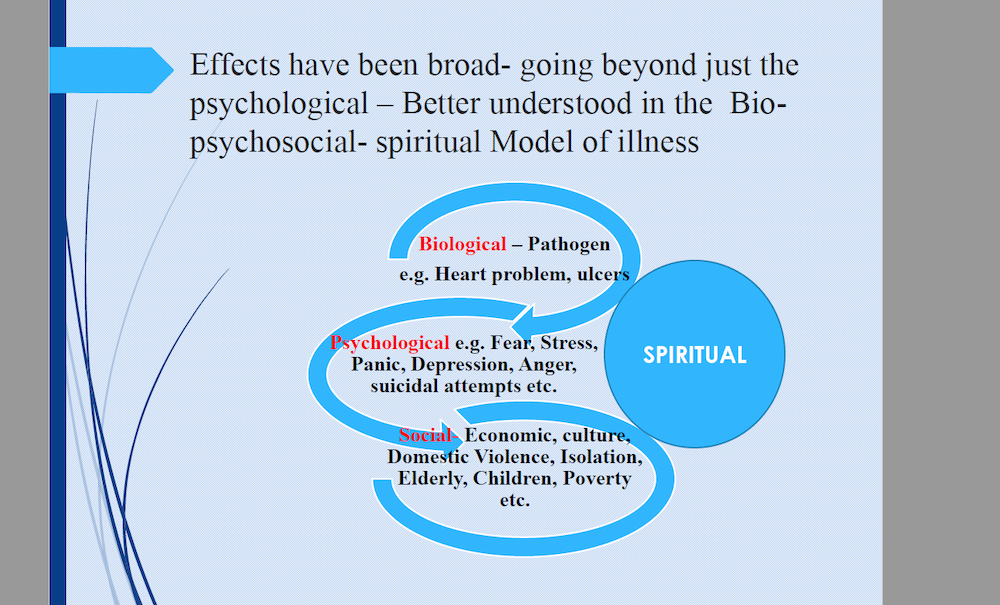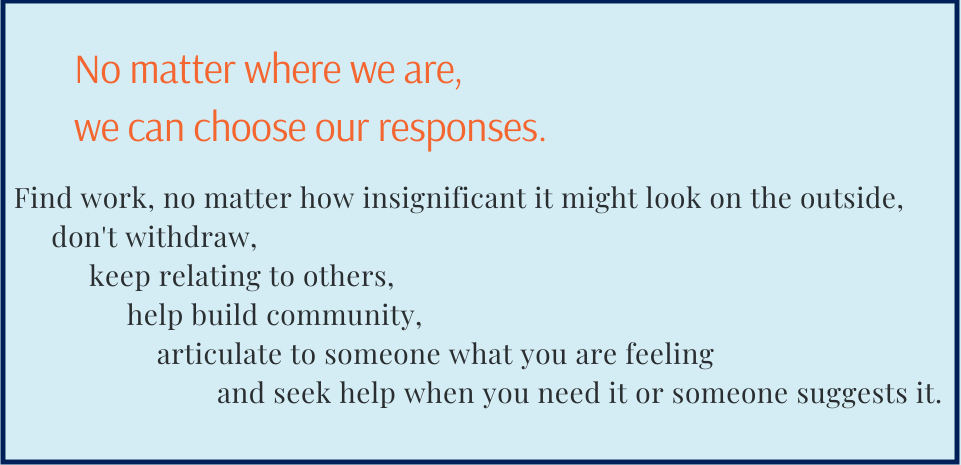
(Unsplash/Igor Lypnytskyi)
For more than nine months, families around the globe have been struggling with the impact of COVID-19, and the current rise of infections and deaths worldwide are alarming. Already worn out from the stresses of isolation, fear and grief, people are being required to continue the struggle to survive and live peacefully with all the extra demands of work or no work, school or no school, less income or no income. Psychological stresses have become more apparent, with little relief in sight.
Having family members or close friends die of COVID-19 has added even more burden to the stress levels. I discovered this personally when in July, my brother, Roger, died from COVID-19. Even though he lived only a few hours away from me and one of my other brothers, we could not go to be with him, nor could our other siblings or his adult children and grandchildren who were even further away. Even though his wife, Madeline, lived only a few miles from the hospital, she was prevented from being with him in the intensive care unit.
Ordinarily, we would have gathered around them. Now, the shock of having to stay away threw all of us into confusion. How could we let Roger know we were with him emotionally and spiritually? How could we let his family know we were with him? These questions circled within each of us, leaving us with feelings of emptiness.
Madeline and Roger Meyer on their wedding day in 2018. Sr. Joyce Meyer's brother Roger died this year, on July 7, from COVID-19. (Provided photo)
At the time of his death, the hospital allowed Madeline to stand behind a window to be with him as the ventilator was removed, but it was small comfort for her as she stood there alone. How do we grieve these losses that have touched so many families and communities? My family, as did many other families here in the U.S., gathered family and friends together virtually to grieve and celebrate Roger's life. But how many people around the world have such resources even for this? Very few, in fact.
So, what happens to our grief when it stays buried within, when we are not even aware of it? How can we manage the pain mentally and physically? These and other questions about the impact of COVID-19 were addressed in a webinar by Sr. Jacinta Ondeng, a School Sister of Notre Dame in Nairobi, about the psychological impact of the coronavirus pandemic.
While I was unable to attend the original webinar, I am conveying key points covered in her presentation. The webinar on Oct. 31 was hosted by The Leadership Guild of Tangaza University, sponsored by Conrad N. Hilton Foundation in partnership with Association of Sisterhoods of Kenya (AOSK) in Nairobi. More than 120 sisters from 20 countries registered for the webinar, though many more benefitted as participants shared it among their congregation members.
Ondeng began by reminding us of the disease's history, beginning first in China in late 2019. She noted that most of us worldwide were sympathetic to China, thinking that the virus was only in that country. Shock ensued as infection spread country by country and our foggy denial disappeared. Early concerns were health precautions and food security, but we were convinced the virus would pass. When the World Health Organization in March declared it a global pandemic, it felt like an unbelievable reality. Everywhere strict restrictions were put in place, health education began and both international and national travel ended. We all stayed home — or were supposed to, except for front-line workers.
Advertisement
Our lives all underwent huge disruption, both at home and at work. Anxiety, fear and blame, then domestic violence increased as food and basic needs could not be met. Children and vulnerable adults became even more vulnerable. Not surprising, young women became targets, and unwanted pregnancy became all too common. Now, many of these women will never continue with their education, a huge tragedy for any country and will put the U.N. Sustainability Goals further behind.
These disruptions exposed stories of deepening poverty and worsening abuse. We had hoped these conditions and COVID-19 would soon pass, but now, Ondeng reminded us, the predicted second wave is upon us. The WHO, governments, researchers and individuals are working hard to contain it, but uncertainty reigns.
She encouraged us to envision COVID holistically as one bio-psycho-social and spiritual condition. Even those of us not infected by the virus have had our health affected because of the stress and anxiety, and have experienced collective and individual grief. Not only have our bodies reacted — internal organs, headaches, stomach issues, tight muscles — but our personal and social psychological well-being are also threatened. Feelings of fear, panic, depression, anger, even suicidal ideas, have surfaced as families struggle with economic concerns, domestic violence, isolation and spiritual issues.
Uncertainty is weighing on us all, wondering how long these conditions will last. I was personally surprised to hear Ondeng suggest that it could be as long as 2024, when I thought the pandemic lasting through 2021 was depressing enough. But, whenever the end time will be, we need to recognize and accept that where we are is the "new normal."

In a recent webinar about the psychological impact of the coronavirus pandemic, Sr. Jacinta Ondeng, a School Sister of Notre Dame in Nairobi, explained about how psychological stress has health, social and even spiritual effects. (Provided screenshot)
As ministers of the Gospel we need to be not only models of this acceptance, but also companions to others to help them understand and accept this new reality. We need to continue following the guidelines and encouraging others, seeking and passing on information only from reliable sources, and monitoring the use of social media, which can lead to anxiety and distress. Because stress and anxiety can evoke memories, even dreams, of past traumas, we need to help ourselves and others to put such experiences into perspective, to integrate them into our histories so that they do not spill over into the present.
I was particularly touched by the part of Ondeng's presentation that dealt with resiliency in light of our responsibilities as Gospel ministers, especially her comments on the importance of learning and practicing skills of resiliency. Resiliency is not something innate. It needs to be exercised. Ondeng defined it as the "process of adapting well in face of adversity, trauma, tragedy, threats or significant stress."
It takes practice to "bounce back," and requires strengthening our inner resources and will power, relationships with family and friends and our spirituality. When these are weak, we can be at risk of psychiatric conditions and disorders. These words would not be foreign to many, even most, of the sisters gathered, as I have witnessed resiliency as one of the greatest strengths of sisters living and working in unbelievable conditions of adversity, trauma, tragedy and threat around the world — and not just surviving but thriving. They are the best examples and companions to those they serve.

Based on writings of Viktor E. Frankl, author of "Man's Search for Meaning" (GSR graphic)
I also liked the practical suggestions she shared from Robert Wicks' book, Bounce, Living the Resilient Life. His suggestions included finding laughter in daily events, practicing gratitude and noticing goodness around you. It emphasized the importance of paying attention to bodily needs like sleep, food and drink, leisure and/or hobbies. And lastly, learning to slow down or pace ourselves as well as "letting go" of controlling every situation. The Serenity Prayer could be helpful here.
Ondeng also referred to one of my favorite authors, Viktor E. Frankl, who survived several concentration camps, including Auschwitz. His book, Man's Search for Meaning, had a huge impact on my life. Meaning is a healing source for life, he says. We can see this same idea lived out in the desert experience of the Jewish people, or in Mary, who feared for her son when she witnessed forces working against him leading him to death.
Frankl learned that work, love and right attitudes are essential for meaning and resiliency. No matter where we are, we can choose our responses. Find work, no matter how insignificant it might look on the outside, don't withdraw, keep relating to others, help build community, articulate to someone what you are feeling and seek help when you need it or someone suggests it.
There are various therapies that can be helpful. One that Odeng described is cognitive behavior therapy. The therapy teaches techniques to identify reactions of fear, anxiety and sadness or other strong feelings, to understand why they happen, and suggests skills to handle them, along with correcting unhelpful beliefs like self-blame, or thinking nothing good can happen.
She finished her presentation with a challenge to find meaning by following Pope Francis' call to, "Heal Our World." In this audience, he exhorted all of us to live out day by day our Catholic social teachings so that we leave no one — nor even the Earth — behind.
[Joyce Meyer is a member of the Sisters of the Presentation of the Blessed Virgin Mary and is GSR's liaison to women religious outside of the United States.]







